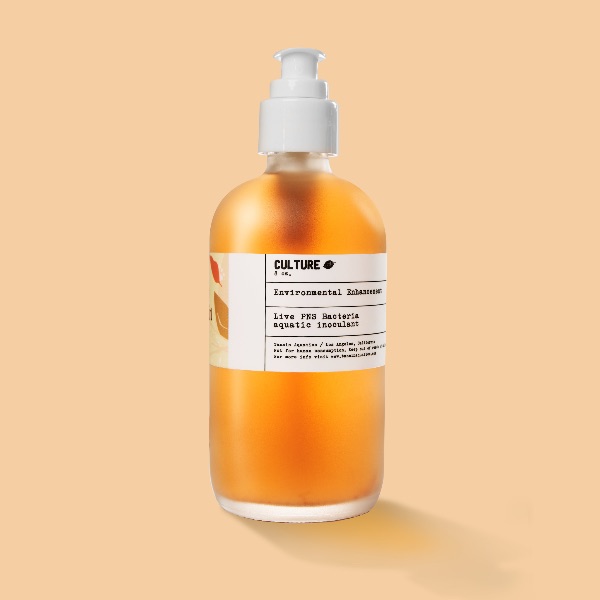
via Tannin Aquatics
Tannin isn’t about doing what’s been done. It’s about creating new things and breaking old things. It’s about finding the pieces to the puzzle and making them available to those that love putting this thing we do together like it means something.
Enter “Culture,” Tannin’s obsession with the living microcosm within our botanical-style aquariums, and the missing piece to the puzzle. We have sourced a uniquely cultured Purple Non-Sulphur Bacteria (PNSB) species, Rhodopseudomonas palustris. This more than incredible bacterium is a perfect complement to your botanical-style aquarium, performing a variety of roles to enhance the “microbiome” of your black water environment. “Culture” contains millions upon millions of these highly adaptable bacteria to create the most aptly suited inoculant for aquariums and vivariums.

It Does More Than Look Good
The PNSB in Culture consumes carbon/nutrients in anaerobic environments, thereby competing with microbes that produce toxic metabolites (e.g. hydrogen sulfide). Unlike nitrifying and denitrifying bacteria, they are capable of performing photosynthesis. In addition, they have been demonstrated repeatedly to possess strong probiotic properties that promote the health of diverse aquatic species.
PNSB is found in freshwater, marine and brackish environments (in the water column, the sediments and even in the guts of animals such as corals). This highly adaptive photosynthetic bacterium balances nutrient cycling in all types of aquatic and terrestrial systems.
Like nitrifying bacteria, PNSB metabolize ammonium and nitrite and nitrate. And they’re not just important to the nitrogen cycle. They’re also capable of aerobic organoheterotrophy – a process of removing dissolved organics from the water column- just like other microbes!
PNSB are useful for their ability to carry out a particularly unusual mode of metabolism: anaerobic photoheterotrophy. In this process, they consume organic wastes while inhabiting moderately illuminated and poorly oxygenated microhabitats (patches of detritus, leaf litter beds, shallow depths of substrate, deeper pores of expanded clay media, etc.). By competing with other anaerobes such as methanogenic archaeans and sulfate-reducing bacteria for food, these voracious “sludge-eaters” significantly reduce the production of toxic byproducts such as methane and hydrogen sulfide!
PNSB have been used to remediate water quality in highly intensive aquaculture operations for many years. They are increasingly being used to amend soils (particularly soils burnt by chemical fertilizers) in horticultural applications. Their probiotic qualities serve to suppress disease in numerous cultured species.
Our Culture PNSB absolutely love living as epiphytes on aquatic plants! Specifically, they consume organic waste products that are secreted by the plant. And the plants love them back! PNSB fertilize host plants with their surpluses of fixed nitrogen.
In addition to helping to maintain an ecologically stable microhabitat, “Culture” provides a nutritious live food source for zooplankton as well as soil mesofauna.
Tannin’s PNSB is also known to form direct, beneficial associations with the root systems of both terrestrial and aquatic plants!
Ultimately, as they are consumed by bacterivores (protozoa, rotifers, copepods, sponges, etc.). PNSB pass essential biomatter (proteins, vitamins and pigments) along the food chain.
Other Benefits of “Culture”:
- It reliably consumes organic matter in anaerobic zones without generating noxious byproducts such as hydrogen sulfide.
- By sequestering organics, it significantly amends water quality and reduces odors while helping to extend the life of activated carbon products.
- It assimilates ammonia, nitrite and nitrate, significantly enhancing a grow system’s overall capacity for fast, natural nitrogen cycling.
- It acts as a powerful probiotic, reducing the occurrence of disease in both plants and animals.
Learn more about Tannin’s Culture at https://tanninaquatics.com/collections/biome/products/culture-live-purple-non-sulphur-bacteria-aquatic-inoculant-8-oz-bottle
###





